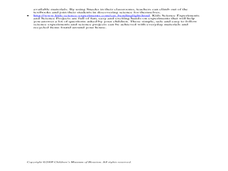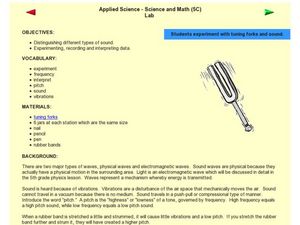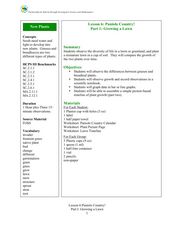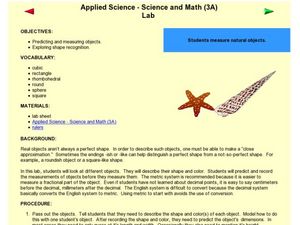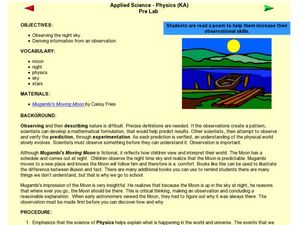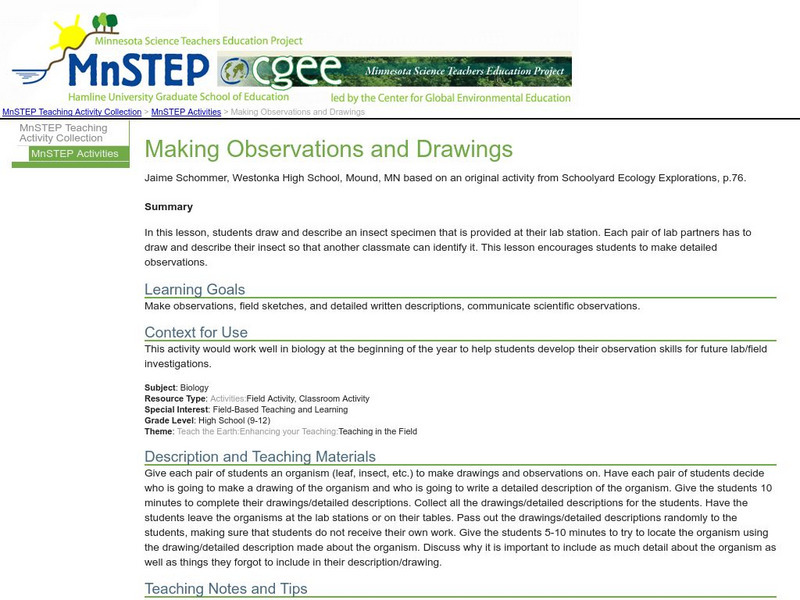Curated OER
States Of Matter
Delv into the states of Matter. Students engage in the scientific inquiry process to uncover the exciting world of Matter. They watch a series of videos, and conduct experiments in order to collect and analyze data on the various state...
Curated OER
Light Travels Through Objects
Students experiment with materials that allow light to pass through. In this physical science lesson, students investigate the way light is absorbed by many different glass objects and household items. Students write their...
Curated OER
Reptiles and Amphibians
Introduce your class to various reptiles and amphibians. They will meet and identify a representative from each of the four major reptile families, then learn about and discuss reptile characteristics. Next, they will identify and...
Curated OER
Sound Observations
Young scholars explore sound waves by conducting an experiment in class. In this sound frequency lesson, students utilize a tuning fork in class and identify which objects in class create different sound pitches on the fork. Young...
Curated OER
Growing a Lawn
Students research plant growth. In this plant growth lesson, students explore the needs of plants. Students compare and contrast grass and broadleaf plants and grow a miniature lawn in a cup of soil. Resources are provided.
Curated OER
Human Fingerprints: No Two the Same
Sixth graders explore scientific observations by analyzing a group of data. In this fingerprint identification instructional activity, 6th graders identify the reasoning behind fingerprinting and create their own ink fingerprints....
Curated OER
Designing a Germination Experiment
Learners explore botany by participating in a seed experiment. In this plant nutrition lesson, students define several science experiment vocabulary terms like observation, treatment, and replicate. Learners utilize soaked seeds in a...
Curated OER
Milkweed and Monarch Butterfly Mania Observations
In this milkweed and monarch butterfly mania observations worksheet, students observe the photo, take notes and make a prediction about the habitat of the monarch butterfly. This page has serveral links to helpful web resources.
Curated OER
Introducing the Use of Dichotomous Keys to Students
Students are introduced to the use of dichotomous keys as a simple means of beginning scientific observations in nature. They comprehend how to use a dichotomous key. Students distinguish characteristics of a group of organisms. They...
Curated OER
Measuring Natural Objects
Students predict the measurement of objects. In this measurement lesson plan, students estimate the measurements of objects in a lab. Students measure irregular objects and generate scientific observations.
Curated OER
Poetry and Observations
Pupils compare poetry and the night sky. In this poetry lesson plan, students read poetry and compare the imagery from the poem with the night sky. Pupils explore how science and poetry relate to one another.
Curated OER
Magnetism
Students explore physical science by participating in a class science activity. In this magnet attribute lesson, students define a list of scientific vocabulary terms associated with magnets and participate in hands on magnet activities....
Curated OER
Focusing on Lenses
Students explore scientific observations by examining the parts of a microscope. In this optics instructional activity, students discuss the importance of a focal point and focal distance when utilizing an optical device such as a...
Curated OER
Learning Scientific Coral Terminology
Students explore properties of coral. In this scientific observation lesson, students investigate properties and characteristics of coral. Students write statements describing the coral using observation words.
Curated OER
Measuring Permeability of Soil, Sand and Gravel
Students investigate the different materials in their environment. In this geology lesson, students collaborate in groups to examine the differences in sand, soil and gravel. Students utilize a magnifying glass or microscope...
Curated OER
Crickets Guided Discovery
Sixth graders investigate insect anatomy by analyzing a live cricket. In this insect science lesson, 6th graders discuss their knowledge of insects and describe their characteristics from memory. Students observe live...
Curated OER
Oobleck
Students examine states of matter. In this solids and liquids lesson, students conduct a scientific investigation that requires them to make oobleck and record their observations pertaining to it.
Science Education Resource Center at Carleton College
Serc: Making Observations and Drawings
This lesson plan will help students develop their scientific observation skills and encourages students to make detailed observations. They will draw and describe insect specimens so another classmate can identify it.
PBS
Pbs Teachers: Scientific American: Chimps R Us: Understanding Travel Routes
Examine a map of the travel routes and evening nesting sites of two chimpanzees and create a travel route of your typical day. Describe the social enhancements that helped humans to evolve from foraging behavior to establish fixed...
PBS
Pbs Teachers: Scientific American: Animal Einsteins: Thinking About Thinking
Investigate the work of ethologists - animal behaviorists - by observing an animal's behavior (alone and then in a group) for an extended period of time. Produce a scientific report of your observations.



